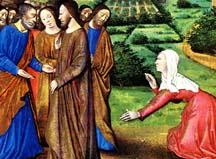For where two or three are gathered together in my name,
there am I in the midst of them.
there am I in the midst of them.

Commentary taken from the New American Bible, unless stated otherwise.
If your brother sins against you....
Your brother....
A fellow disciple.
Against you....
Some manuscripts do not have the words "against you". In this case it would read, "if your brother sins" and thus, broadens the type of sin in question.
If he refuses to listen even to the church,then treat him as you would a Gentile or a tax collector.
In the Jewish community, gentiles and tax collectors were not welcome.
Whatever you bind on earth shall be bound in heaven....
The church's judgment will be ratified in heaven, i.e., by God. It would seem that in this verse the power given previously to Peter of binding and loosing is now also given to the church. But this is not so. Here only the power of excommunication is intended.
If two of you agree on earth about anything for which they are to pray....
The section ends with a saying about the favorable response of God to prayer, even to that of a very small number, for Jesus is in the midst of any gathering of his disciples, however small.
This saying is similar to one attributed to a rabbi executed in A.D. 135 at the time of the second Jewish revolt: ". . . When two sit and there are between them the words of the Torah, the divine presence (Shekinah) rests upon them".
My reflection on prayer:
We pray together in community when we come to church, when we join a prayer meeting, when we start a meeting with a prayer, when we pray for the dead together.
While we should continue asking individuals to pray for us or for our intentions, we should also ask groups to pray for us or for our intentions.



